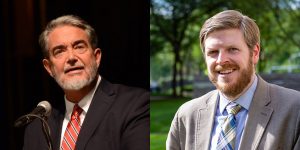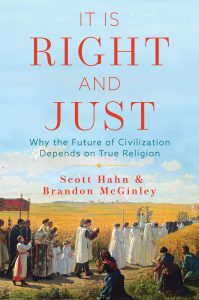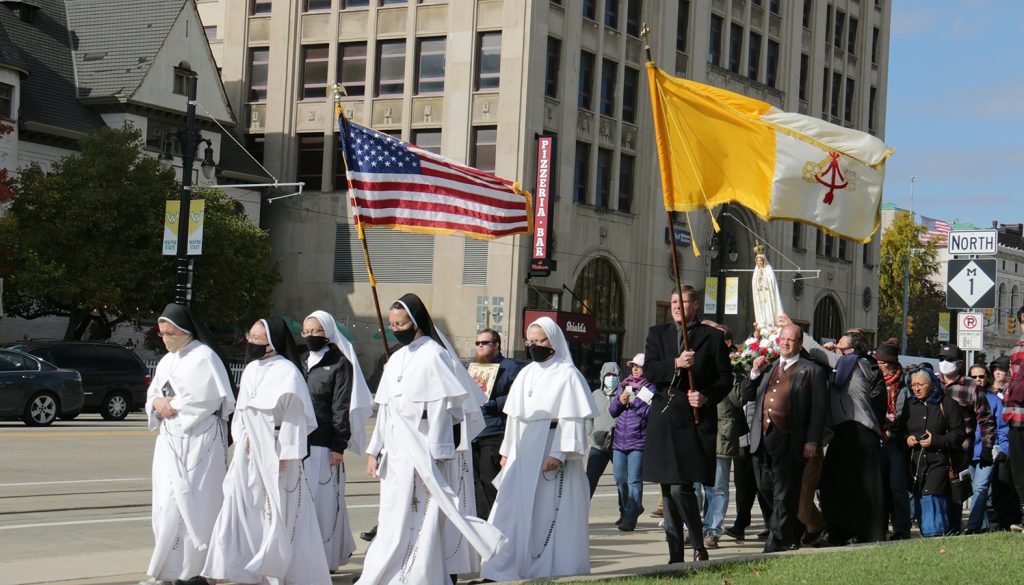In a world that’s becoming more and more anti-religion, does God have a place in society?
According to Scott Hahn, Ph.D., not only does he have a place, but he is the foundation. In “It Is Right and Just: Why the Future of Civilization Depends on True Religion” (Emmaus Road Publishing, $20.66), Hahn, with co-author Brandon McGinley, explains the grand vision of salvation history, and why religion is vitally needed to fulfill that plan throughout society.
Kris McGregor: This book might seem as though it’s about a particular political dilemma we find ourselves in today. And yet, it addresses the very essence of who we are as human beings.
Scott Hahn: When you say it seems to address a particular problem we face right now, that is true, but not just in this particular moment, but in the last 2,000 years of Church history.
Sanctity is what God wants for each of us, and for all of us together.
We might think that sanctifying the social order, which is exactly what Vatican II called for — not sanitizing it, not cleaning it up, but sanctifying it — seems inappropriate or impossible. Well, sanctifying Scott Hahn is humanly impossible.
And yet, if God is all-powerful in his merciful love and can make me a saint, there’s no reason why the Lord doesn’t want to do this. This is what Christ was sent to accomplish.

McGregor: You talk about the fall of Rome and St. Augustine’s “City of God,” and you point out that you can’t go in and take over the government and all these other institutions. Sanctification has to start with the transformation, inwardly, of ourselves, by living out the Christian life that flows from receiving the Eucharist. That life is so bright and so shining that people are attracted to it.
Hahn: Not only is St. Augustine’s book important, in some ways it’s transformative. In the “City of God,” we have for the very first time a theology of universal human history. And it’s not just looking at Rome and why it was collapsing. It’s not just looking at Israel either.
The word city in Latin, “civitate,” refers not only to an urban metropolis but also to an extended family. And what Augustine does by beginning with Genesis is look through the lens of Genesis 10, the Table of Nations, to show that God gave to ancient Israel what no other ancient people ever possessed — a genealogy that extends to all.
The 70 nations identified in Genesis 10 represent all of the peoples descended from one human family. It’s one big family that becomes one big broken family in Genesis 11 with the Tower of Babel. But Augustine shows God’s promise to Abraham in Genesis 12: “I will bless all the nations through you, bless all the families of the earth, so that they will form one family.” This has been on the mind of God, his fatherly heart, from the beginning.
So what is the most important thing? Which political party you belong to? No. How you worship is the most important thing. There is lower justice, which is economic and transactional. There’s a slightly higher justice, which is social in terms of equity and fairness and how we treat the needy and the infirm. And there’s the highest form of justice, which is toward the things that are transcendent. This is something that Augustine recognized, but so did Cicero and Seneca, so did Plato and Aristotle.
You can’t pay back your parents and give them life. You can’t pay back your country and give it the common good. But you show honor and respect and piety toward your parents. You show patriotism toward your country. And toward God, you offer worship, which is the highest form of justice.

We don’t do this simply because we find worship in the Bible. We also find it in the natural law, through natural reason, and it applies to the natural order. We owe God thanks and praise. It is right and just to give that to him, and it’s wrong not to. It’s not just a personal injustice; it is a cosmic crime. It is a massive social injustice to privatize religion, to relativize the truth of God.
Only right religion is just, Augustine explained. The worship of pagan gods through idolatry brought all sorts of immorality, and also all sorts of judgment. It was the truth of the right religion of the Catholic faith upon which Rome depended. This was the faith of the City of God, which is based on love of God above all things, even to the contempt of self, and love of neighbor as oneself for the love of God. The City of Man, on the other hand, going all the way back to Cain, who murdered his brother, is based on the love of self even to the point of the contempt of God.
What we have to rediscover is that as Catholics we all have dual citizenship, because our primary and everlasting citizenship is in heaven. So if we’re living in America and we love our country, the best thing we can do for our country here on earth is to bring down upon it the grace from heaven so that more and more people can enter into the City of God, into the family of God.
McGregor: This book explains the reason why in the liturgy we say, “It is right and just.” Sometimes we look at religion as something that falls out from spirituality. And in actuality, isn’t it religion that comes first, and everything else flows from that?
Dr. Hahn: There’s so much more truth in what we say than what we’re conscious of when we’re saying it. When we say it is right and just for us to give God thanks and praise, then we want to spread that kind of justice. And not just in terms of legality.
Jesus taught us that to love God with all of your heart, mind, soul, and strength — the greatest commandment — is not just for Israel. And to love your neighbor as yourself is also not just true for Israel. These commands are true for all people. That’s not just private, but public. Not just personal, but social. It’s not just liturgical, it is religious. It’s political. It is all of the above.
The word “liturgy” is derived from the Greek word “leitourgia,” which, in ancient Greece, was used to describe the department of public works. In what we call the professions — medicine, law, teaching — you literally had to profess faith because you were not just involved in a commercial transaction where this is yours and that is mine.
You were giving life, truth, justice. And so you had to make a profession of faith because you were serving the common good, not just your own private interests. You professed your faith in God and asked him: “So help me, God.”
McGregor: What do you say to lay Catholics who are unsettled and confused and just trying to make it through, or to non-Catholics who are looking to the Catholic Church right now, and who are hearing in some voices, in some circles, disunity, division, and even accusation?
Dr. Hahn: It’s important to recognize that the principle of unity is Christ, working through the Holy Spirit, with the blessed Virgin Mary at his side, and all of the angels and saints who assemble with us for every sacramental celebration, every liturgy, and every Mass, especially.
Sometimes you need to renew the wellspring in your prayer life, because it’s become stagnant, a bunch of habits that are no longer fresh, just as you have to reignite a flame in your marriage from time to time. I think what I’m hearing Our Lord saying to his people is this: “Find me, fall back in love with me. Because I’m in search of you, and I want to make the prayers that you offer something more than the prayers that you say.”
I think we have to rekindle that romance with Our Lord and Our Lady. Our Lord reminds me again and again: “Do what you can, give it to me, and I will multiply those five loaves, those two little fish as I choose.” And so into his hands we commit ourselves, our families, our parish, our diocese, and the whole Catholic Church.
Remember that it’s Catholic because it’s universal. The saints and the angels and the mother of God are the true-blue, full-fledged members of the Catholic Church. We, in the state of grace, we are in the Church Militant. But they’re in the Church Triumphant, and we need to strengthen our bonds with them in order for them to assist us in becoming saints.
These are truths, not just talking points; they’re not just articles in the creed. These are the realities that will continue long after the Democratic and the Republican parties are chapters in history books.

